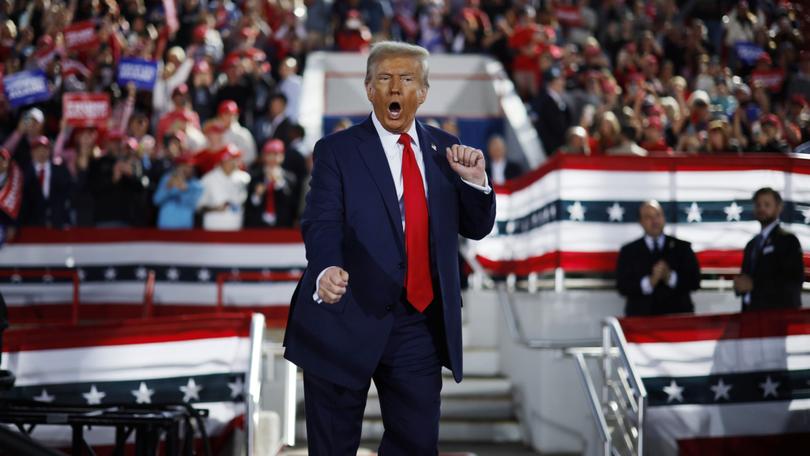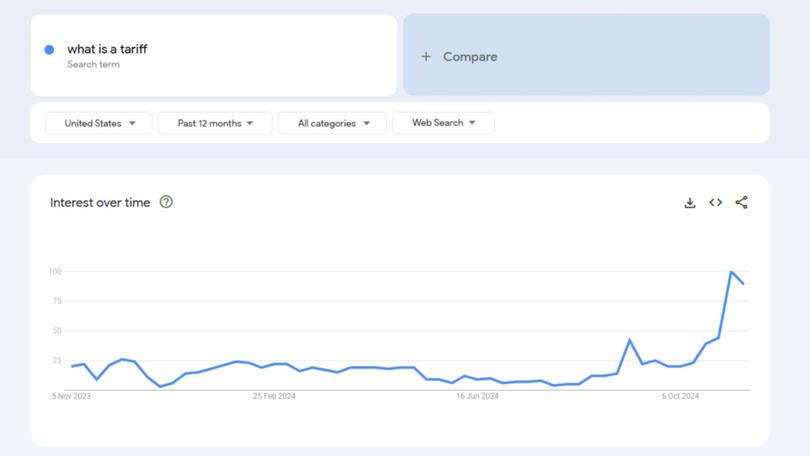What is a tariff? Google searches for term tariff spike after Donald Trump elected as president
One big question hangs over the heads of millions of American voters after the US election. And they’re taking to Google to ask it in huge numbers.

Big questions hang over the heads of millions of American voters — across the political spectrum — after the US election.
Donald Trump is due to return to the White House as the 47th President of the United States after his sweeping victory against Kamala Harris at the polls last Tuesday. He busted through the Democrats’ hard-fought Blue Wall, claiming every swing state to secure 312 electoral college votes to Ms Harris’ 226.
Republicans have flipped the Senate, they look certain to retain the House, and Mr Trump is poised to win the popular vote, too — something no Republican candidate has done, not even he did in his first campaign, since 2004.
Sign up to The Nightly's newsletters.
Get the first look at the digital newspaper, curated daily stories and breaking headlines delivered to your inbox.
By continuing you agree to our Terms and Privacy Policy.And yet, while he apparently convinced more Americans to vote for him and his hardline promises to fix the economy and immigration — by enforcing tariffs and launching a mass deportation campaign — it seems voters are only now looking into the 78-year-old’s politics.
Google searches for the term “tariff” have spiked after the election, as have queries about “Trump’s tariff plan” — spiking more than 1650 per cent since the election. Searches for “who pays tariffs” have risen 350 per cent since the election.
To be fair, the vast majority of people may not know the intricacies of tariffs — let alone heard about them — before Mr Trump waxed lyrical about them throughout his re-election campaign.
The Republican candidate has plans to impose a blanket 10 to 20 per cent tariff across all imports into the US, as well as an extra tariff of 60 to 100 per cent on goods imported from China. The decision spooked economists and retailers, who warned the costs would be borne by consumers, not exporters.
The National Retail Federation (NRF) warned the tariffs could cost American consumers between $US46 billion and $US78 billion on basic goods — or about $US2600 a year per family. Its analysis estimated the cost of individual consumer goods could rise by tens if not hundreds of dollars.

During an appearance on Joe Rogan’s podcast last month, Mr Trump said America could “become rich with the proper use of tariffs”, pointing to “tariff king”, US President William McKinley — who led the States from 1897 until he was assassinated in 1901.
“He spoke beautifully of tariffs. ‘We will not allow the enemy to come in and take our jobs and take our factories and take our workers and take our families unless they pay a big price. And the big price is tariffs.’”
A tariff, simply put, is a tax placed on goods when they cross national borders. Imports and exports can be taxed, but the US Constitution does not allow expert tariffs.
They can be used to protect the local economy — by increasing the price of imports relative to domestic goods, thereby encouraging consumers to buy locally — or for the government to generate revenue.
Another question American voters are seeking answers to is “Can I change my vote?”, which some suggest shows Republicans are getting cold feet.
Some took to Threads, the Meta messaging app that many Twitter users flocked to after Elon Musk took over and rebranded the platform to X, to mock the belated research efforts.
“Yes, really. People thought they would get to play takes-backsies on VOTING,” one user wrote.
“This happened after Brexit, too. People had no idea what they voted for,” another added.
One said there was “nothing like ‘doing your research’ after you vote”.
